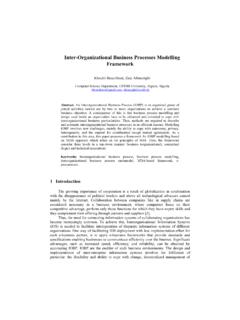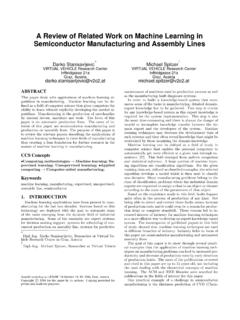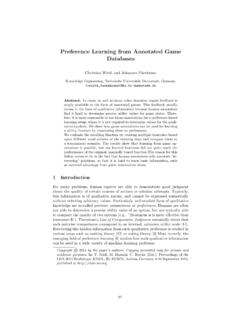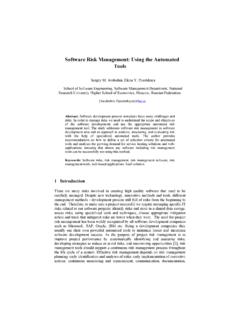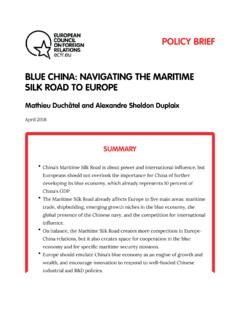Transcription of Bottom-up decentralized approach to innovation strategy
1 Bottom-up decentralized approach to innovation strategy Dariusz Kralewski University of Gda sk, Department, Faculty of Management, Department of Business Informatics, Poland Abstract. New conditions contributes the emergence of new concepts of inno-vation strategies in the enterprise. The study conducted by The Economist Intel-ligence Unit shows a new approach to innovation . Future innovations will be enforced and invented by users (clients)and they will be a key element of com-petitive advantage. The company will therefore be forced to turn their custom-ers to its information system. It is therefore important to carefully "listening" customers and capture the information about their needs and innovative solu-tions to current processes and the creation of new products and services.
2 Among innovation strategies the most important will become the open innovation strat-egy. The IT department is in this situation before a huge challenge. Will it have to open all channels of communication, collect huge amounts of data, analyze them and present innovative solutions. Continuous development of new tech-nologies should help in this task. Innovative decisions in an era of decentraliza-tion will be undertaken by the regular employees giving impetus to the rapid development of companies. In order to these decisions were correct the compa-ny should focus more on employees, supporting them by training system, sug-gesting ethical standards and give freedom in making decisions and carrying re-sponsibility for them.
3 This forces a different approach to the management of the company in which the staff will set goals and a variable innovation strategy . Keywords: innovation strategies, decentralization, technological innovations, Bottom-up innovations 1 Introduction In theory and practice of strategic management, innovation (change) is considered as one of the main conditions for success and competitive advantage and innovation strategy is an important part of long-term strategy for development. It is a thesis that can be found in all modern books dedicated to strategic management. Especially sec-tor of small and medium enterprises in the current difficult economic situation, des-perately needs a strategy oriented at innovate using new system and financial solu-tions.
4 Meanwhile, according to studies and publications from various centers, only a few companies use the chances given by the introduction and implementation of modern innovation strategy . innovation strategies, as an essential part of competitive strategy adopted by the company, represent area of interest representatives of the main schools of strategic management, such as P. Drucker, M. Porter, G. Yi-pa, J. Kay. In the twenty-first cen-tury, it was noted that the globalization of economic activities, dissemination of in-formation networks and the growing concerns and risks associated with changes in the global market reinforcing the importance of innovation strategies.
5 Strategies for innovation , both strictly related to the development of technology and with the crea-tion of new solutions in the management, are becoming increasingly important for the company and give it the possibility of obtaining a competitive advantage. Particularly important becomes the types of strategies that facilitate the rapid changes in business, and adapt to market changes [1]. Under these conditions, it is crucial not only the object of strategy of innovation , but also conditions for the rapid implementation of the strategy and achieve anticipated benefits associated with it. As is emphasized in a number of companies it is created a kind of pressure to innovate, leading to the build-ing internal culture of innovation -oriented [2].
6 New conditions also contributed to the emergence of new concepts of innovation strategies in the enterprise. They can be adapted not only to large international corpo-rations on their own, developed hinterland of research and development, but also in small and medium enterprises that innovation are based on creativity of entrepreneur and his colleagues [3]. 2 The era of decentralization The study, conducted by The Economist Intelligence Unit [14], shows that until 2020, the impact of new technologies on location and method of the work will make that the company will enter into a new era of decentralization. 63 percent.
7 Business leaders expected a shift towards decentralized business structures, and the responsibility for business decisions will belong not to the central administration, but to individual em-ployees. The new era will be characterized by a typical structure that functioned in the past that have been criticized for inefficiency, duplication and lack of a coherent strat-egy for action. Instead, the company will implement a process-oriented strategy . Key information will remain centralized, so that employees can more easily receive, store and retrieve them. This will ensure more effective and efficient data processing, which in turn will increase workers' rights to search for information needed for direct cooperation with customers and to make important business decisions, avoiding un-necessary delays.
8 Decentralization will cause a delegation of power to down, until the regular employees. Promoting better cooperation with customers is extremely important, because busi-ness leaders predict that by 2020 customers will be the main source of ideas for new products and services. In addition, 86% of business leaders share the view that cus-tomers will become an integral part of the internal decision-making process, and pro-ject teams will include people outside the organization, as customers and business partners [14]. In the new era of decentralization would be very important that business leaders choose right partners who can help in the optimization of key business processes, they remain under control, and data are integrated and secured.
9 Employees and teams should have easy access to information to be able to use them for the benefit of the organization. Only such an approach will prevent duplication, ensure consistency and, more importantly, will provide a precise analysis of the costs incurred by the compa-ny. Marketing managers should work with the IT managers, to enable customers to create innovation . Better cooperation between them is essential to enable future inno-vations inspired by customers. According to research until 2020 for 30 percent of business leaders from the finan-cial, educational, IT, manufacturing and public sectors [4], the main source of ideas for new products will be customers, then the Internet community, at the end research and development.
10 This contrasts with the present state of things, where customers are in second place, and the first generator of ideas are the teams for research and devel-opment. However, the main source of ideas for improving business processes, there will still be employees - 34 percent of business leaders just lists employees and pro-vides that this state of affairs until 2020 will not change [4]. It is also envisaged increase in the amount of data generated each year by 40 per-cent [5]. Still a large amount of printed materials will be used in key business pro-cesses. 43 percent of European organizations still manually processing key business transactions [6].
